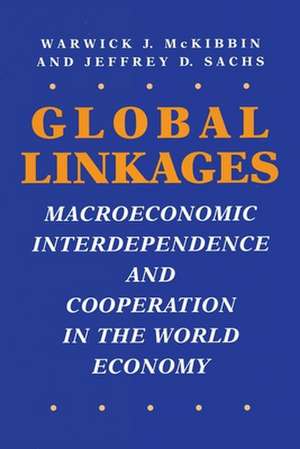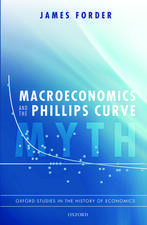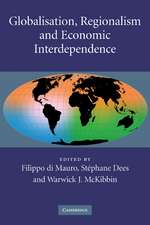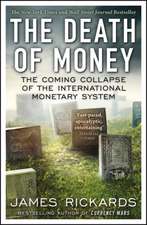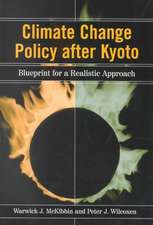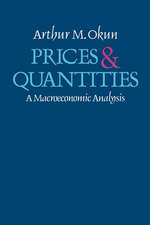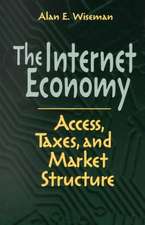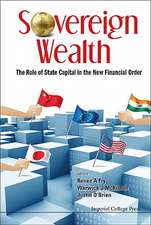Global Linkages: Macroeconomic Interdependence and Cooperation in the World Economy
Autor Warwick J. McKibbin, Jeffrey D. Sachsen Limba Engleză Paperback – iun 1991
With the rapid deterioration of the U.S. trade balance in the 1980s, the United States was forced to finance deficits by borrowing heavily from the rest of the world. In doing so, the United States went from being the world's largest creditor country to the world's largest debtor, while Japan and West Germany experienced a rise in trade surpluses. Such a shift in international trade flows has had profound effects on the world economy. McKibbin and Sachs address a range of issues involving macroeconomic imbalances in the world economy. Through the use of a new simulation model of the world economy they explore how policy actions undertaken in one country affect the trade flows and macroeconomic patterns among the other counties. The authors show that key macroeconomic features of the 1980s can be explained by shifts in monetary and fiscal policies in the major economies and by supply shocks due to changes in oil prices. In addition to showing how the global macroeconomic experience can be understood, they focus on a number of current policy issues, including the reduction of global trade imbalances, the consequences of U.S. fiscal consolidation, the effects of an oil price shock, the implications for the U.S. economy of increases in Japanese and German fiscal spending, the effects of targeting exchange rates among the major currencies, and the gains of increased coordination of macroeconomic politics among the major economies. In several cases, their conclusions are shown to be quite different from those that form the basis of many conventional views. The authors also analyze the importance of interaction between policymakers in industrial economies and conclude by reemphasizing the need for U.S. politicians and policy experts to recognize that macroeconomic results in the U.S. now depend heavily on events abroad.
Preț: 198.39 lei
Nou
Puncte Express: 298
Preț estimativ în valută:
37.100€ • 39.15$ • 31.83£
37.100€ • 39.15$ • 31.83£
Carte tipărită la comandă
Livrare economică 24 februarie-10 martie
Preluare comenzi: 021 569.72.76
Specificații
ISBN-13: 9780815756019
ISBN-10: 0815756011
Pagini: 277
Dimensiuni: 152 x 229 x 24 mm
Greutate: 0.36 kg
Ediția:New.
Editura: Brookings Institution Press
Colecția Brookings Institution Press
ISBN-10: 0815756011
Pagini: 277
Dimensiuni: 152 x 229 x 24 mm
Greutate: 0.36 kg
Ediția:New.
Editura: Brookings Institution Press
Colecția Brookings Institution Press
Descriere
With the rapid deterioration of the U.S. trade balance in the 1980s, the United States was forced to finance deficits by borrowing heavily from the rest of the world. In doing so, the United States went from being the world's largest creditor country to the world's largest debtor, while Japan and West Germany experienced a rise in trade surpluses. Such a shift in international trade flows has had profound effects on the world economy. McKibbin and Sachs address a range of issues involving macroeconomic imbalances in the world economy. Through the use of a new simulation model of the world economy they explore how policy actions undertaken in one country affect the trade flows and macroeconomic patterns among the other counties. The authors show that key macroeconomic features of the 1980s can be explained by shifts in monetary and fiscal policies in the major economies and by supply shocks due to changes in oil prices. In addition to showing how the global macroeconomic experience can be understood, they focus on a number of current policy issues, including the reduction of global trade imbalances, the consequences of U.S. fiscal consolidation, the effects of an oil price shock, the implications for the U.S. economy of increases in Japanese and German fiscal spending, the effects of targeting exchange rates among the major currencies, and the gains of increased coordination of macroeconomic politics among the major economies. In several cases, their conclusions are shown to be quite different from those that form the basis of many conventional views. The authors also analyze the importance of interaction between policymakers in industrial economies and conclude by reemphasizing the need for U.S. politicians and policy experts to recognize that macroeconomic results in the U.S. now depend heavily on events abroad.
